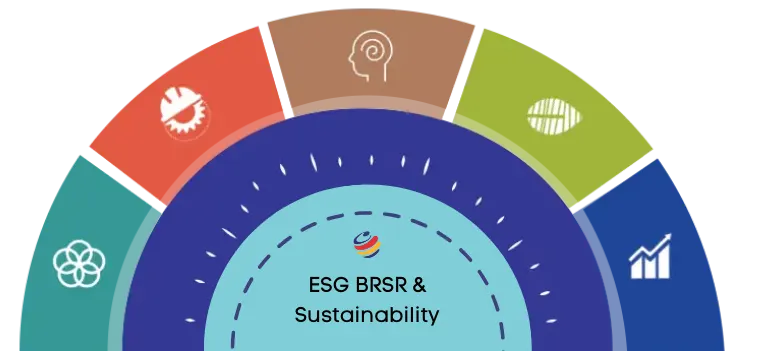Sustainability Calendar 2025
This Sustainability Calendar is a visual celebration of our shared commitment to a sustainable and inclusive planet. Each month reminds us of the significant days that bond us together.
Celebrating the interconnection of the flora, fauna, air, water, soil, people and the planet.
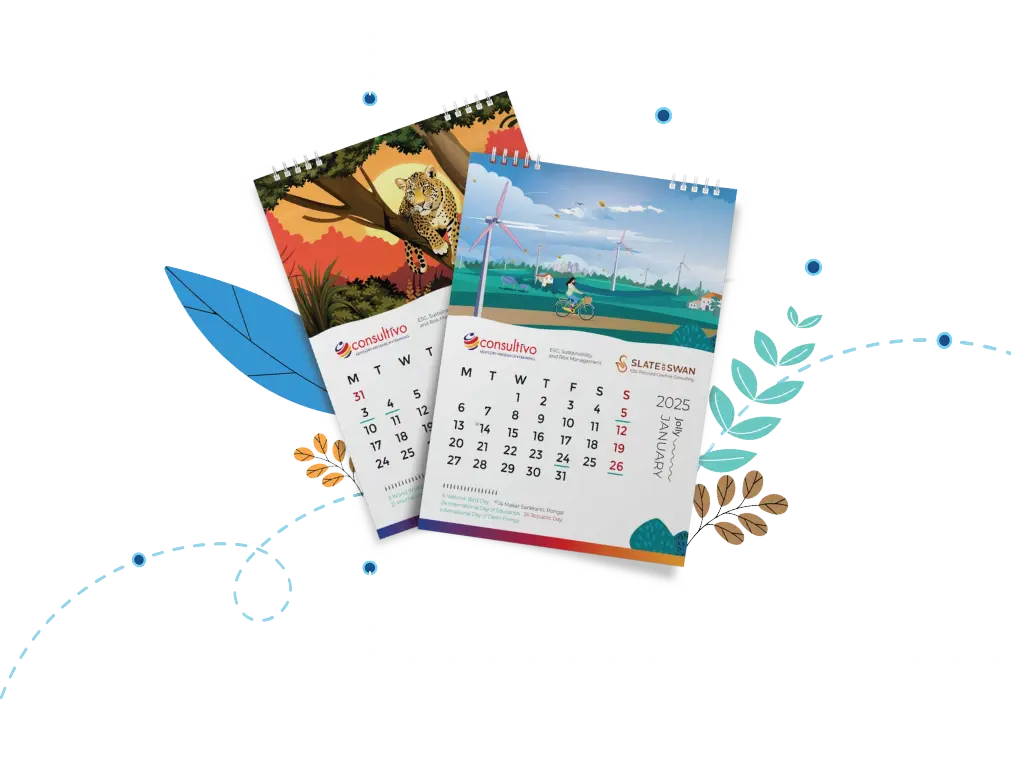
Awareness for all, an urgent call,
Inspiring actions to make the planet inclusive for all.
Each theme highlights the intricate balance between nature and humanity, offering actionable insights for individuals and businesses alike.
Whether it’s understanding the importance of biodiversity, promoting safe practices, or embracing sustainable livelihoods, this repository aims to empower you with knowledge and inspire impactful change.
This repository can serve as an engaging and informative tool, empowering individuals and businesses to take tangible actions toward cleaner air. It connects awareness with practical steps for meaningful change.
Together, let’s explore, learn, and champion a healthier planet for generations to come.
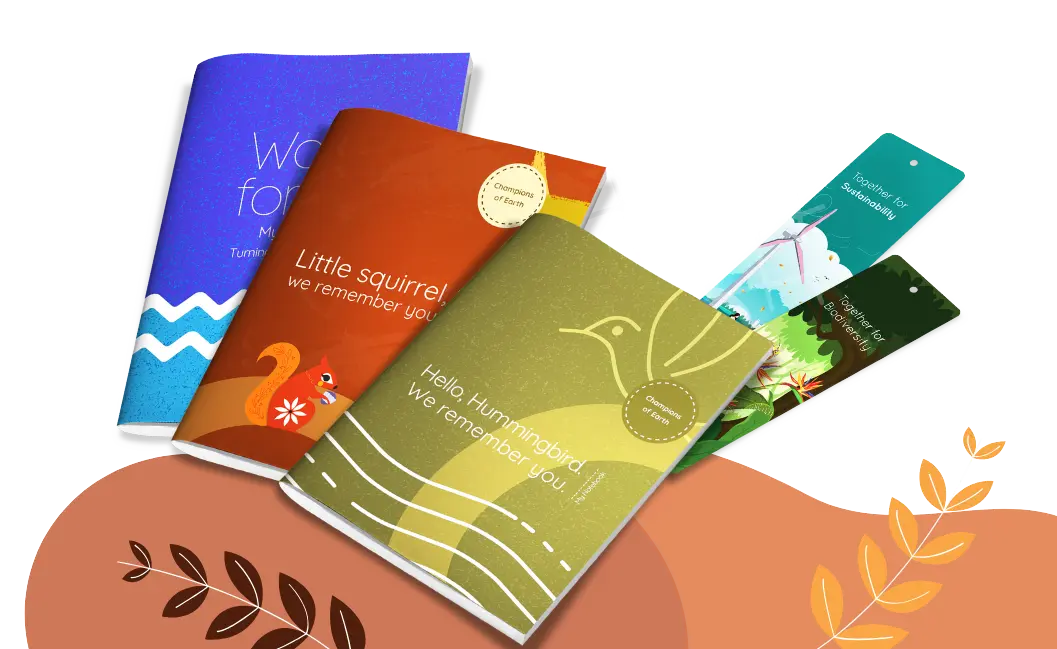
A Dance with the Wind

Under a brilliant blue sky, wind turbines spin as a girl pedals through the landscape. A perfect way to celebrate sustainable solutions on the International Day of Clean Energy!
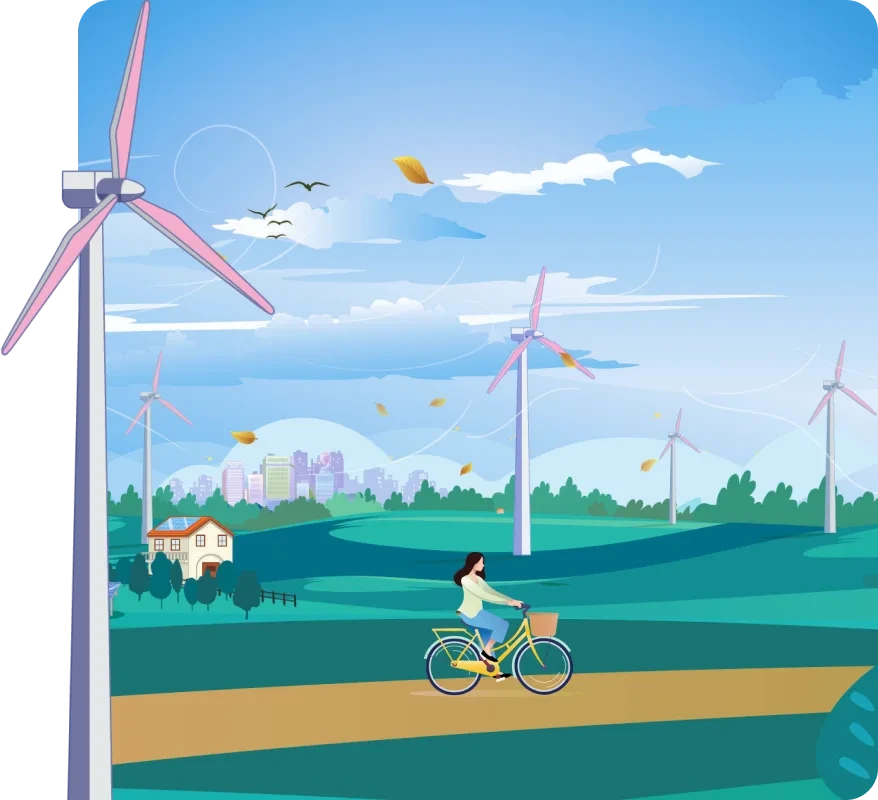
Did You Know?
- Indoor air can be 2–5 times more polluted than outdoor air due to poor ventilation and emissions from household products, paints, and furniture
- Over 90% of the global population breathes polluted air, causing nearly 7 million premature deaths annually
- Switching to cleaner stoves and fuels in households could save lives and significantly reduce air pollution
- Trees act as nature’s air filters, with one mature tree absorbing up to 48 pounds of carbon dioxide per year
The Healthy Balance of Nature in Wetlands

Wetland birds, flapping and flying, are a positive indicator of our planet. On World Wetlands Day, we celebrate this ecosystem that provides food, shelter, and safety for migratory birds, tiny microorganisms, amphibians, and countless plant species.
Did You Know?
- Wetlands cover only about 6% of the Earth’s land surface but support 40% of all plant and animal species globally
- Wetlands act as nature’s kidneys, filtering pollutants and improving water quality. A single acre of wetland can store up to 1.5 million gallons of floodwater
- Coastal wetlands save an estimated $23 billion annually in storm protection by buffering coastal areas from hurricanes and other extreme weather
Wetlands in Focus: Insights to Act
50%
of the world’s wetlands have been lost since 1900 due to urban development, agriculture, and industrial activities
84%
decline of Freshwater vertebrate populations between 1970 and 2016 due to habitat loss and water pollution
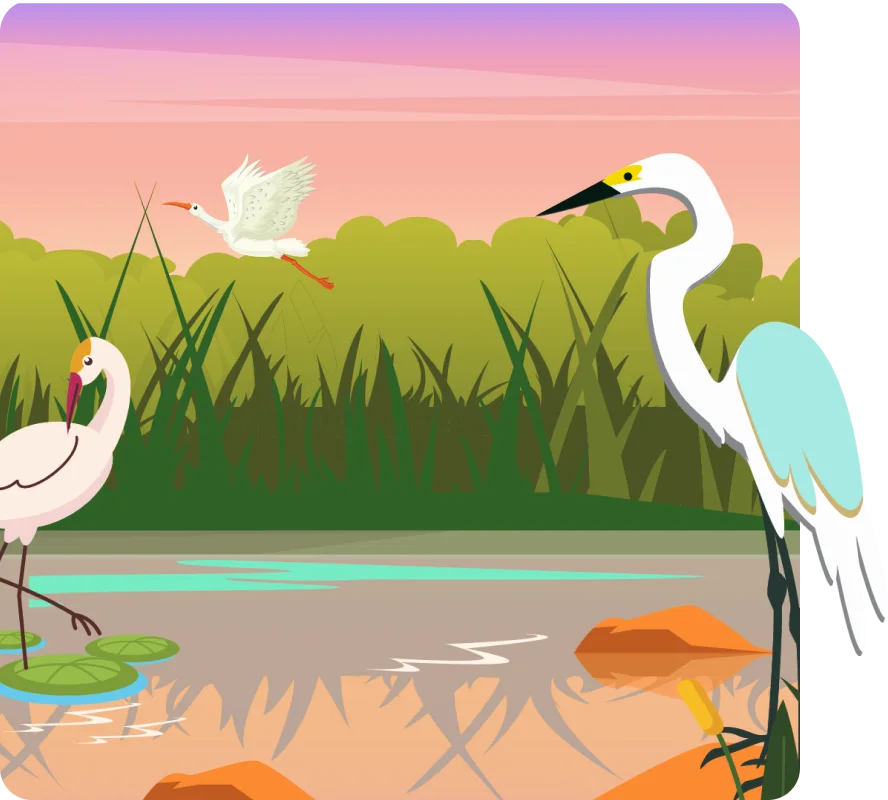
January Theme: Practical Tips to Contribute toward Clean Energy
- Reduce emissions: Use public transportation, walk, or bike instead of driving cars, which are among the largest contributors to air pollution
- Conserve energy: Switch off electronics and lights when not in use. Opt for energy-efficient appliances to reduce emissions
- Maintain air circulation indoors: Open windows or use air filters to keep air moving and reduce indoor air pollutants
- Adopt greener habits: Avoid burning trash, limit single-use plastics, and recycle where possible to reduce particulate pollution
- Plant trees: A single tree can improve local air quality and contribute to reducing the heat island effect in cities
February Theme: Practical Tips to Contribute toward Balance in Wetlands
- Reduce Pollution: Avoid using chemical fertilizers and pesticides, which can contaminate wetland ecosystems.
- Conserve Water: Reducing water waste helps maintain the hydrological balance critical for wetlands.
- Participate in Wetland Cleanups: Join or organize local clean-up events to remove trash and invasive species.
- Promote Native Vegetation: Plant native species in your area to support wetland biodiversity
March Theme: Practical Tips to Protect Wildlife
- Support sustainable products: Choose eco-certified items like seafood or wood products to discourage habitat destruction.
- Limit plastic use: Avoid plastics that pollute habitats and harm marine and terrestrial wildlife
- Participate in citizen science: Engage in local wildlife monitoring programs to aid conservation efforts.
April Theme: Practical Tips for Safety
- Industrial:
- Conduct regular workplace hazard assessments and safety drills.
- Provide workers with proper personal protective equipment (PPE) and ensure its usage.
- Adopt technologies like IoT to monitor real-time safety conditions in hazardous areas.
- Road:
- Always wear seatbelts, regardless of seating position in the vehicle.
- Follow speed limits and avoid distractions like texting while driving.
- Ensure regular vehicle maintenance to prevent malfunctions that could lead to accidents.
- Domestic:
- Anchor heavy furniture and appliances to prevent tip-overs.
- Install smoke detectors and check them regularly.
- Keep cleaning agents and sharp objects out of children’s reach.
May Theme: Practical Tips for Conservation
Adopt Sustainable Practices:
- Avoid products made from endangered species or their habitats.
- Support sustainable seafood choices to protect marine biodiversity.
Plant Native Species: Create habitats that attract and sustain local wildlife.
Educate Others:
- Spread awareness about endangered species and conservation efforts.
Reduce Your Carbon Footprint:
- Use public transport and energy-efficient devices.
- Participate in local habitat restoration projects.
June Theme: Practical Tips to Safeguard Oceans
- Conserve water: Fix leaks, use water-efficient appliances, and avoid unnecessary water use to reduce strain on freshwater sources.
- Avoid pollution: Use biodegradable products and minimize plastic usage to prevent toxic waste from entering waterways.
- Support wetlands restoration: Advocate for or donate to projects aimed at restoring degraded wetlands, which act as natural water filters and flood controllers.
- Plant trees near water bodies: Trees help prevent soil erosion and maintain the health of rivers and streams.
July Theme: Practical Tips to Protect Biodiversity
- Support Sustainable Products: Purchase goods certified as sustainable, such as FSC-certified wood and organic produce, to reduce harm to ecosystems
- Create Biodiversity-Friendly Spaces: Incorporate native plants in your garden to support pollinators and local wildlife. Avoid using harmful pesticides
- Reduce, Reuse, Recycle: Minimizing waste and conserving water are small but impactful steps to reduce the strain on natural resources
- Avoid Wildlife Products: Ensure that souvenirs or goods you purchase do not contribute to illegal wildlife trade
August Theme: Practical Tips to Support Indigenous Communities
- Educate Yourself: Learn about the history, cultures, and current challenges faced by Indigenous Peoples to foster understanding and respect.
- Support Indigenous Businesses: Purchase goods and services from Indigenous-owned enterprises to promote economic empowerment.
- Advocate for Land Rights: Support policies and initiatives that recognize and enforce Indigenous land rights, crucial for their autonomy and environmental stewardship.
- Participate in Cultural Events: Attend Indigenous-led workshops, seminars, and cultural events to engage directly and learn from their perspectives.
September Theme: Practical Tips to Improve Air Quality
- Reduce Vehicle Emissions: Opt for public transportation, cycling, walking, or carpooling to decrease the number of vehicles on the road, thereby reducing air pollution.
- Conserve Energy: Turn off lights and electronics when not in use, and choose energy-efficient appliances to lower power plant emissions.
- Support Clean Energy: Advocate for and invest in renewable energy sources like solar and wind to reduce reliance on fossil fuels.
- Practice Waste Reduction: Recycle, compost, and reduce the use of single-use plastics to minimize waste that contributes to air pollution when incinerated.
- Promote Green Spaces: Plant trees and support urban green spaces, as vegetation helps absorb pollutants and improve air quality.
October Theme: Practical Tips toward Conserving Habitats
- Choose Sustainable Seafood: Opt for seafood certified by reputable organizations that ensure sustainable fishing practices, such as the Marine Stewardship Council.
- Reduce Bycatch: Support fishing methods that minimize the unintentional capture of non-target species, which helps maintain ecological balance.
- Advocate for Policy Change: Engage with policymakers to promote regulations that enforce sustainable fishing quotas and protect marine habitats.
- Support Local Fishermen: Purchase seafood from local, small-scale fishers who adhere to sustainable practices, thereby supporting their livelihoods and encouraging responsible fishing.
- Educate Yourself and Others: Learn about the impacts of overfishing and share this knowledge to raise awareness and drive collective action.
November Theme: Practical Tips to Support Sustainable Fishing
- Choose Sustainable Seafood: Opt for seafood certified by reputable organizations that ensure sustainable fishing practices, such as the Marine Stewardship Council
- Reduce Bycatch: Support fishing methods that minimize the unintentional capture of non-target species, which helps maintain ecological balance.
- Advocate for Policy Change: Engage with policymakers to promote regulations that enforce sustainable fishing quotas and protect marine habitats.
- Support Local Fishermen: Purchase seafood from local, small-scale fishers who adhere to sustainable practices, thereby supporting their livelihoods and encouraging responsible fishing.
- Educate Yourself and Others: Learn about the impacts of overfishing and share this knowledge to raise awareness and drive collective action.
December Theme: Practical Tips to Support Mountain Ecosystems
- Practice Responsible Tourism: When visiting mountain areas, stick to marked trails to minimize environmental impact and avoid disturbing wildlife.
- Support Reforestation Efforts: Participate in or donate to tree-planting campaigns aimed at restoring native flora and combating soil erosion in mountain regions.
- Avocate for Sustainable Policies: Engage with local and national authorities to promote policies that protect mountain environments and support sustainable development.
- Educate and Raise Awareness: Share information about the importance of mountains and the challenges they face due to climate change and human activities.
- Support Local Communities: Purchase products from mountain communities to support their economies and encourage sustainable livelihoods.

From Insights to Impactful Communication
Consultivo’s trusted insights meet Swan’s creative excellence. Transform your ESG message today.


